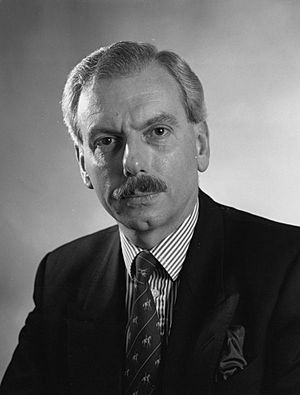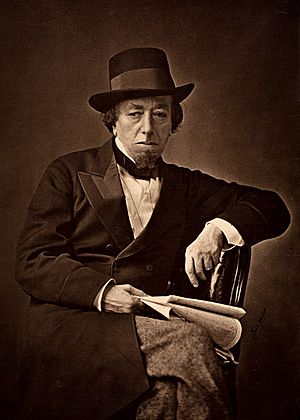David Starkey facts for kids
Quick facts for kids
David Starkey
|
|
|---|---|

Starkey when a lecturer at LSE in the early 1980s
|
|
| Born | David Robert Starkey 3 January 1945 Kendal, Westmorland, England |
| Occupation |
|
| Education | Fitzwilliam College, Cambridge (BA, PhD) |
| Partner | James Brown (from 1994; died 2015) |
David Robert Starkey is an English historian and television presenter. He was born on January 3, 1945. He is known for his conservative ideas.
He was the only child of Quaker parents. He went to Kendal Grammar School. Later, he studied history at Cambridge University on a scholarship. There, he became an expert in Tudor history. He wrote his main university paper about King Henry VIII's household.
After Cambridge, he taught history at the London School of Economics until 1998. He has written several books about the Tudor period. Starkey first appeared on television in 1977. He was also a regular guest on the BBC Radio 4 show The Moral Maze. He has presented many historical documentaries. In 2002, he signed a big contract with Channel 4 for TV shows.
In June 2020, Starkey made a comment during a podcast interview. Many people said it was racist, and he later apologized. After this, he lost several honorary titles and memberships. His book contracts were also cancelled.
Contents
Early Life and School
David Starkey was born on January 3, 1945, in Kendal, Westmorland. He was the only child of Robert Starkey and Elsie Lyon. His parents were Quakers who had moved to Kendal in the 1930s. They often faced unemployment during the Great Depression. This taught him the "value of money."
Starkey was born with two club feet. One was fixed early, but the other needed several operations. He also had polio. At age 13, he had a nervous breakdown at secondary school. He spent several months recovering. He later said this was because of the "highly competitive environment" at school.
He did very well at Kendal Grammar School. He won debating prizes and acted in school plays. Even though he liked science at first, he chose to study history. A scholarship helped him go to Fitzwilliam College, Cambridge. There, he earned a top degree, a PhD, and a fellowship.
Starkey was very interested in King Henry VIII. His PhD paper focused on the Tudor king's inner household. His supervisor was Professor Sir Geoffrey Elton, a Tudor expert.
Career in History and Media
Starkey was a fellow at Fitzwilliam College, Cambridge, from 1970 to 1972. In 1972, he became a history lecturer at the London School of Economics. He left his university teaching career in 1998. He said he was bored and annoyed by the paperwork of modern academic life.
He had already presented a Channel 4 documentary series called This Land of England in 1984. After leaving teaching, he started writing and presenting history documentaries for BBC television. His first was Henry VIII in 1998.
Starkey became well-known as a guest on the BBC Radio 4 debate show The Moral Maze. He debated important topics with other guests. He gained a reputation for being direct and sometimes harsh. He once said his personality had "a tendency towards showmanship." The Daily Mail newspaper called him "the rudest man in Britain." Starkey reportedly joked that this image was worth a lot of money. He left the show after nine years, saying he was bored of being "Dr. Rude."
From 1995, he also hosted radio shows on Talk Radio UK. One of his most embarrassing moments was an interview with Denis Healey. Starkey thought Healey would be friendly, but Healey strongly challenged him.

His first TV appearance was in 1977. He was a witness in a 1984 ITV show called The Trial of Richard III. His TV documentaries about The Six Wives of Henry VIII and Elizabeth I were very popular.
In 2002, he signed a big contract with Channel 4. This was to produce 25 hours of TV shows, including Monarchy. This series told the story of English kings and queens from Anglo-Saxon times. In 2009, he presented Henry: Mind of a Tyrant. A reviewer called it "highly fascinating." In 2011, he taught history lessons in Channel 4's Jamie's Dream School. After this, he criticized the state education system.
He believed that history should focus on stories and biographies. He felt that schools had focused too much on "skills" instead of knowledge. He argued that "In order to think, you actually need the information in your mind."
Starkey was elected a Fellow of the Royal Historical Society in 1984. In 1994, he became a Fellow of the Society of Antiquaries of London. He was also an Honorary Fellow at his Cambridge College, Fitzwilliam College, from 2006 until 2020. He has also worked as a curator for exhibitions. In 2003, he curated an exhibit on Elizabeth I.
Political Views
Changing Political Stance

David Starkey's political views have changed over time. He once supported the Labour Party but became a conservative in the late 1970s. He blamed the economic problems of the time on the government.
He supports a type of conservatism called "one-nation conservatism." He believes that Victorian Prime Minister Benjamin Disraeli was a great example of this. Starkey has written that Disraeli was "exotic" and good with words. He thinks working-class people need more "nationalism" like Disraeli showed.
Involvement in Politics
In the 1980s, Starkey was an active member of the Conservative Party. He ran as a Conservative candidate for the Islington Borough Council in 1986 and 1990.
He has often criticized political leaders from different parties. In 2011, he spoke at a Conservative Party meeting. He said that then-Mayor Boris Johnson was a "jester-despot" and Prime Minister David Cameron had "no strategy." He urged the party to connect more with working-class people.
Views on the UK Constitution
Starkey prefers big changes to the UK's constitution, similar to the federal system in the United States. However, he supports the monarchy, the Queen, and Prince Charles.
He believes the modern UK House of Commons has become weak. He thinks it should return to its original role of challenging state authority.
Personal Life
David Starkey lived for many years with his partner, James Brown. James Brown was a publisher and book designer. He passed away in 2015. The couple had three homes.
Honours and Awards
Starkey was made a Commander of the Order of the British Empire (CBE) in 2007. This was for his services to history.
Commonwealth Honours
| Country | Date | Appointment | Post-nominal letters |
|---|---|---|---|
| 2007 | Commander of the Order of the British Empire | CBE |
Scholastic Honours
| Location | Date | School | Degree |
|---|---|---|---|
| Fitzwilliam College, Cambridge | First-class honours Bachelor of Arts (BA) in History | ||
| Fitzwilliam College, Cambridge | Doctor of Philosophy (PhD) in History |
| Location | Date | School | Position |
|---|---|---|---|
| until 2015 | University of Kent | Honorary Visiting Professor of History | |
| 2006 – 3 July 2020 | Fitzwilliam College, Cambridge | Honorary Fellow | |
| until 3 July 2020 | Canterbury Christ Church University | Visiting Professor of History |
| Location | Date | School | Degree | Status |
|---|---|---|---|---|
| 21 July 2004 | University of Lancaster | Doctor of Letters (D.Litt.) | Revoked on 24 July 2020 | |
| 11 July 2006 | University of Kent | Doctor of Letters (D.Litt.) | Revoked in 2020 | |
| March 2019 | University of Buckingham | Doctor of Letters (D.Litt.) | Revoked on 3 July 2020 |
Memberships and Fellowships
| Location | Date | Organisation | Position |
|---|---|---|---|
| 1984 – 13 July 2020 | Royal Historical Society | Fellow (FRHistS) | |
| 1994 – 6 July 2020 | Society of Antiquaries of London | Fellow (FSA) | |
| 1996 – 2005 | The Society for Court Studies | President |
| Location | Date | Organisation | Position |
|---|---|---|---|
| 2008 – 3 July 2020 | Mary Rose Museum | Trustee and Hon. Commodore | |
| 2005 – 2020' | National Maritime Museum | Hon. Commodore |
Awards
| Location | Date | Institution | Award |
|---|---|---|---|
| 2001; withdrawn on 3 July 2020 | The Historical Association | The Medlicott Medal |
Works
Books
- Elizabeth: The Struggle for the Throne (published in North America as Elizabeth: The struggle for the throne)
- Monarchy: From the Middle Ages to Modernity (A compilation of The Monarchy of England: The Beginnings, Monarchy: From the Middle Ages to Modernity and some new material)
Television Shows
- Henry VIII (1998, revised 2001)
- Elizabeth (2000)
- The Six Wives of Henry VIII (2001)
- Edward and Mary: The Unknown Tudors (2002)
- David Starkey: Reinventing the Royals (2002)
- Monarchy by David Starkey (2004–2007)
- Henry VIII: The Mind of a Tyrant (2009)
- Kate and William: Romance and the Royals (2011)
- Jamie's Dream School (2011)
- The Churchills (2012)
- David Starkey's Music and Monarchy (2013)
- Britain's Tudor Treasure: A Night at Hampton Court, co-presented with Lucy Worsley (2015)
- David Starkey's Magna Carta (2015)
- Reformation: Europe's Holy War (2017)
Applications
- Kings and Queens by David Starkey for iPhone and iPad (2011)
 | Janet Taylor Pickett |
 | Synthia Saint James |
 | Howardena Pindell |
 | Faith Ringgold |

